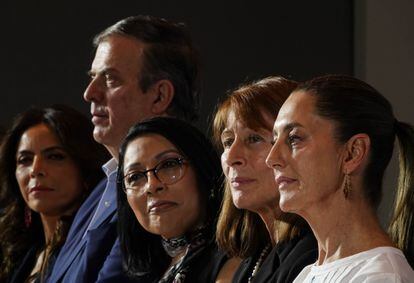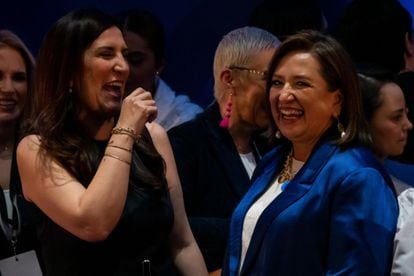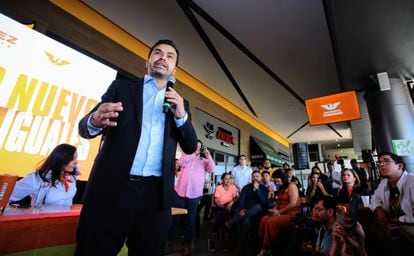It has been three decades since presidential debates were established in Mexican democracy. The exchanges have evolved and have moved from stiff formats to more flexible ones where the candidates interact more with each other and with the citizens, who are no longer treated as passive spectators (they are, nothing more and nothing less, the voting subject). On average, in the last two presidential elections, 10 million Mexicans have watched each debate on television, 10% of the electorate, according to INE figures. To this we must add the views through social networks (in 2018, around six million users watched each broadcast). The importance that citizens give to these meetings is undeniable. This Sunday, within the framework of the elections on June 2, the first debate of presidential candidates will be held. Claudia Sheinbaum, candidate of the Let's Keep Making History coalition (Morena-PVEM-PT), arrives at the fair as a favorite in the polls. The opponent Xóchitl Gálvez, from the Fuerza y Corazón por México (PAN-PRI-PRD) alliance, seeks to overcome the race from second place. Jorge Álvarez Máynez, at the bottom of the polls, has put his trust in undecided voters.
How much a debate can change electoral preferences does not only depend on the discursive performance of the candidates. The truth is that they have an impact. In the memory of the Mexican voter is that image of the empty lectern that highlighted the place left by Andrés Manuel López Obrador, in 2006, when he did not want to appear at the exchange, in the first presidential election in which he presented himself as a candidate and that he would lose to the PAN member Felipe Calderón. For analyst Luis Miguel Carriedo, a specialist in electoral legislation, this Sunday's debate may allow the distances between candidates to be shortened or lengthened. “Being a platform, a forum, a concentration of eyes and ears of millions of people watching the performance of the candidates, it can have an impact. It can mean a shake-up in the course of electoral campaigns, where gaps widen or distances shorten, and even strengthen actors who were not part of the picture. It may be a turning point, perhaps not the great defining one. It will depend on the substance, on what the candidates put on the table,” he says in an interview.
Sheinbaum, Gálvez and Álvarez Máynez have exercised for this Sunday's debate, especially during the Easter holidays, and have foreseen all possible scenarios depending on their place in the polls. It depends on who they will focus their darts on and how much they will be on the offensive or defensive. None of the candidates is new to the political profession. Sheinbaum, a 61-year-old PhD in Physics, was an activist in university movements and has been a ruler and public servant for more than two decades. Gálvez, a 61-year-old businesswoman, has been a government official and senator of the Republic. Álvarez Máynez, the youngest in the race, 38 years old, has been a local and federal deputy and a member of the leadership of his party.
For this first debate, which will take place at the INE offices in Mexico City and will last two hours, the moderators—journalist Denise Maerker and host Manuel López San Martín—will ask the presidential candidates 30 questions sent by citizens through digital platforms. The exchange will focus on education, health, transparency, combating corruption, non-discrimination, vulnerable groups and sexist violence. The spokespersons for the three campaigns have spoken with EL PAÍS about the discursive strategies of each candidacy.
Sheinbaum: giving proposals and managing the blows
Sheinbaum's spokesperson, Tatiana Clouthier, who was Secretary of Economy in the López Obrador Government, affirms that the presidential candidate will prioritize the explanation of her proposals, but will not be defenseless against the highly anticipated attacks of the opposition candidate. “We are the only ones who have made proposals and the others have dedicated themselves to discussing them or scaring people. We do bring proposals and we don't have to dance to their tune,” she explains in an interview. Clouthier mentions the 100 government proposals published by Sheinbaum at his campaign kick-off event, on March 1, related to the economy, security, education, infrastructure and energy transition.
The spokesperson assures that, after a month of campaigning, the Morena candidate arrives at the first debate “extremely strong, consolidated and confident.” She affirms that Sheinbaum has known how to conduct herself “on two tracks”: in private meetings with specific groups, such as businessmen and academics, and in public squares, where she has come into contact with thousands of supporters. Clouthier points out that so far the candidate has led more than a hundred events, while Gálvez, he assures, does not reach half of them. “I think she has several advisors who have not coordinated with each other. They are between dirty war and discrediting. They are a little confused with the strategy. Now they say they support social programs! ”She ponders.
Sheinbaum's team has anticipated that, in this Sunday's competition, Gálvez will bring up criticism about the collapse of Metro Line 12, which occurred in 2021, when the candidate was president of Mexico City, and the collapse of the Rébsamen school. , which occurred in the 2017 earthquake, when the Tlalpan mayor's office governed. Faced with this, the advisors consider going on a counteroffensive during the debate. “We bring a clear strategy of walking with proposals and defending ourselves when required,” says Clouthier. “The candidate is prepared with everything, and she will know if she simply continues with our proposals or if we would need to put in reinforcement to be able to show that the one she is in front of, well, she, she doesn't know how to read, she needs teleprompter“She needs to stick gum to stop her nervousness and she needs an audience to make her laugh, that is, she is the entertainer at parties, she is not a woman who is taken seriously,” she points out.

rtoscuro)
Gálvez: contrast with “the truth”
In the debate, Gálvez will focus on presenting citizens with a “true” diagnosis about the country's situation, advances Senator Kenia López, spokesperson for the opposition candidate. “The strategy will have to be based, first of all, on telling the truth, because Mexico requires that the authorities, that the government, that the president tell the truth about how to rebuild this very hurt country,” she says. The spokesperson maintains that Sheinbaum will not be able to present good accounts on issues such as health, education and transparency, three of the main pending issues of the López Obrador Administration, she points out. “This Government has been totally opaque and has hurt the institutions in charge of providing information to Mexicans, such as the INAI. It is impossible to think that [Sheinbaum] will make some credible proposal, that is why we will be based on the truth and they will have to lie about these issues, because, if they say what they have done, people will not accompany them,” he adds.
López affirms that Gálvez will make a contrast that will allow citizens to recognize two visions of the country and embrace the alternative proposed by the PAN-PRI-PRD candidate. “Xóchitl is going to demonstrate intelligence and love for Mexico, and she is going to be punctual in the proposals we have,” she summarizes. In this work of contrast, he specifies, Gálvez will not dedicate efforts to confront Álvarez Máynez, located in third place in electoral preferences. “Yes, it is necessary to emphasize some points of the candidate, but it seems clear to me that today the contest is between two visions of the country: either Morena and its allies, or this opposition front that seeks security, health and certainty for Mexicans,” exposes.
The spokesperson says that the debate will help Gálvez show citizens the simplicity that characterizes her and that contrasts with the profile of traditional politicians. She is a very intelligent woman, very disciplined, very hard-working, very studious, tireless, and that helped a lot in the debate preparation meetings. There is a transcendent seal that I really like and that is that she is going to be herself, and that gives certainty of trust, of empathy, of humanism. It is a great opportunity for millions of Mexicans to get to know Xóchitl as she is: intelligent, brave, telling the truth,” she says.

Máynez: the debate as a catapult
The MC candidate sees in the presidential debate a way to project himself nationally and take off from the third place in which all the polls place him. Senator and spokesperson Laura Ballesteros affirms that Álvarez Máynez and the party have faced an onslaught from “de facto” powers that have tried to prevent the candidate from appearing on the presidential ballot. “It has been a process marked by dirty and black campaigns against MC. It seems that there is a very important interest from the de facto powers that we do not present competitive candidacies or that we do not exist on the ballot, and I think that this is very serious for Mexican democracy because it represents the alternative for the future that we are putting on the table , a social democratic, progressive, laborist, humanist vision of the country's youth,” he maintains.
Ballesteros claims that the race has been unequal because Sheinbaum and Gálvez began campaigning, illegally, months ago. Added to this, he assures, is the media siege placed around Álvarez Máynez, which has hidden his campaign activities from the public. “Of course the debate for us is the turning point of the contest, it is also part of our strategy from the beginning, because there they are going to meet Álvarez Máynez, they are going to know the contrast that it means, they are going to see the proposals, They will see that we represent the future of this country, because, given that, neither of the other two candidates has anything to do and nothing to say. So, imagine what the debate is for us in terms of collective construction,” he says.
The spokesperson indicates that Álvarez Máynez is “the best parliamentarian and debater in the country.” “That gives us a huge advantage. We also have the best proposals for a Mexico that is eager for the future,” she points out. Despite the candidate's tribune qualities, she points out, Álvarez Máynez has prepared a lot for this Sunday's meeting. “This is the most important game of his life. Imagine if it is not going to be prepared,” he illustrates.

Subscribe to the EL PAÍS Mexico newsletter and to the channel electoral WhatsApp and receive all the key information on current events in this country.
#presidential #debate #Sheinbaum #Gálvez #committed #contrasting #projects #attacks #Máynez #seeks #catapult